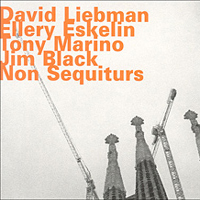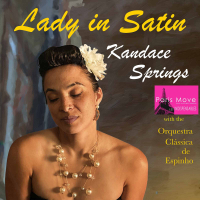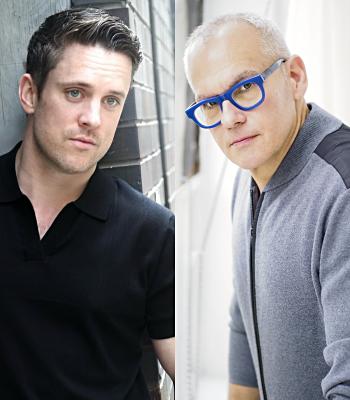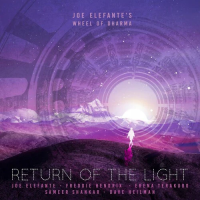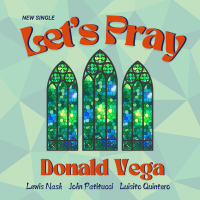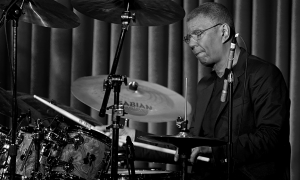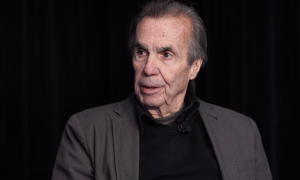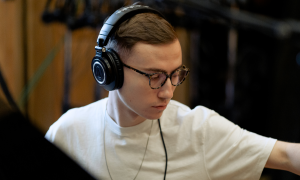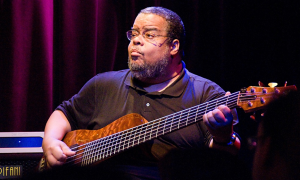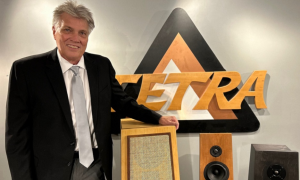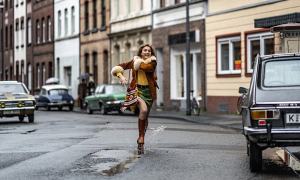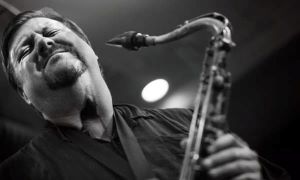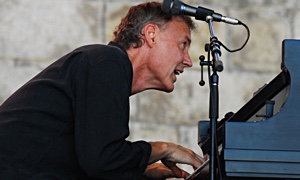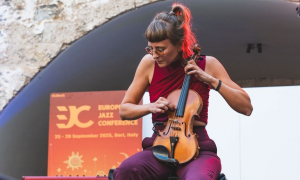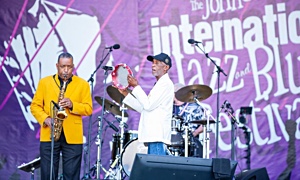Home » Jazz Articles » Interview » Ron Miles: Jazz Gentleman
Ron Miles: Jazz Gentleman

Courtesy Monica Frisell
[Editor's note: Last month, All About Jazz contributor Florence Wetzel conducted a two-hour interview with Ron Miles. The result is the most extensive interview piece ever written about the Colorado-based trumpeter. Part 1 covers his early years and education; Parts 2 and 3, bringing Miles up to the present, will be published on consecutive days.]
Now at the midpoint of his career, trumpeter Ron Miles has created a musical output of astonishing versatility and depth. He has nine releases as a leader, including the upcoming Quiver (Enja, 2012) with guitarist Bill Frisell and drummer Brian Blade, and he has also appeared as a sideman on dozens of other projects. Miles accomplished all this from his home base of Denver, Colorado, far from the New York City jazz scene. But talent sets its own geography, and over the years Miles has been the trumpeter of choice for artists as diverse as Frisell, bandleader Mercer Ellington, drummer Ginger Baker, clarinetist Don Byron, and pianist Jason Moran. Musicians and listeners alike are drawn to Miles' unique trumpet style, which is a powerful blend of unpretentious clarity and deep heart. As his frequent collaborator Bill Frisell says, "Ron Miles is an inspiration to me. Nobody sounds like him."
Other factors set Miles off as a singular force in the jazz world. First, he is a prolific composer and arranger; his nine releases all feature his distinctive compositions, and he is a skilful interpreter of other writers' material, whether it's bandleader Duke Ellington's "Doin' the Voom Voom" or bassist Charles Mingus' "Pithecanthropus Erectus." He's also a devoted jazz educator; Miles has taught at Metropolitan State College in Denver for almost 25 years, and he is now running the school's innovative jazz education program. In addition, Miles is beloved throughout the jazz community for his humility and good heart; as pianist Art Lande says about Miles, "You can hear kindness in his playing; it comes through in his sound."
Miles is also full of surprises: he cites U2 and Janet Jackson as musical influences, one of his albums features a cover of the Partridge Family's "I Woke Up in Love This Morning," and he has been known to carry his mutes onstage using a Scooby-Doo lunch box. This playfulness and open-mindedness is just another facet of Miles' talent, which is firmly rooted in his strong work ethic and solid moral compass. The combination of all these elements makes Miles both an outstanding musician and an admirable human being.
Early Years and Education
All About Jazz: You were born May 9, 1963, in Indianapolis, Indiana. What was your relationship to music in your earliest years, before you got your first instrument?Ron Miles: Well, my folks listened to music a lot. We moved around a lot, but they always had records. I remember certain records being around; I remember Drums Unlimited (Atlantic, 1966) by drummer Max Roach, seeing that cover around. So there was music always playing. But as far as listening to music, the first record I bought was by this band Redbone; they did that song "Come and Get Your Love." And then I bought Jackson 5 records and stuff like that. I also watched the Archies cartoon every Saturday. So I really didn't have much trumpet music that I was listening to; it was more just pop music of the day.
AAJ: So when did you start playing an instrument?
RM: When I was 11. It was actually the summer before we moved here to Denver. My mom taught summer school, and she wanted me and one of my sisters to do something during the summer, and so she signed us up for band. We both went into this band room and they said, "Pick an instrument." The trumpet looked shiny, so I picked that. My sister picked the clarinet, and then we were playing. Then when we moved here to Denver, we just kept in band from that point on. That was the start of it.
AAJ: Can you go into detail about your formal education in middle school and high school, in terms of your classes and learning the trumpet?
RM: When I got to Denver in 1974, I started sixth grade at Phillips Elementary School and played in beginning band. Then I went to middle school—I went to Smiley Junior High School, which is now called Smiley Middle School. I was in beginning band, and I had braces at that point, so the trumpet was really, really rugged. And I remember that having this name "Ron Miles" was just a horrible burden because I was so bad. People would say, "Oh yeah, Ron Miles! Wow, let's hear you play!" Then I would go [makes horrific, garbled noise]. They'd say, "Oh, wow. Really?" So it was really, really, really rough.
But the second year of junior high school, the teacher Dale Hamilton showed up, and he excited us about music. At that time the trumpeters Maynard Ferguson and Chuck Mangione were really big, so he'd bring their records in, and we'd also hear those guys on the radio. Dale was also like, "Yeah, Maynard Ferguson's great, but there's also trumpeter Clark Terry, and there's also these other cats." Dale would give me records to listen to, particularly Clark Terry; I really liked Clark Terry a lot. So my ears kind of expanded, but I was still Maynard-ed out, just because that music was so exciting for me. Dale also got me lessons with this great player in town, Gordon Dooley, who's still around—a beautiful player with a beautiful sound. So that's when I first got private lessons.
Then when I got to high school, Jerry Noonan was our band director, and like Dale Hamilton he was really good, because they both would always stress the music above everything else, more than flashy technique or whatever. And they would always try and get us to listen to real musical tunes and play real musically, with dynamics, with subtlety and nuance, and they kept enforcing that. So that was great for me.
Then in high school, too, I also played in this career-education center, a kind of all-city combo. And some of the players around town now, like the drummer Jill Frederickson—she's great, she played in that group when I was in there. Pianist Neil Bridge was the director, and he's around town still. And same thing, Jerry would try to get us to listen to tunes and really try to be better musicians, with music always being really, really important, more than flash or anything else. So that was great. Mr. Dooley also got me into classical music, Maurice Andre and all that kind of stuff, so that expanded my horizons a bit, too.
So by the time I got to college, I was actually playing pretty good. It was definitely a slow climb. Once the braces came off, it was a big jump at that point, but it was kind of a steady incline.
AAJ: So all these classes and all these courses were actually jazz trumpet, as opposed to classical trumpet?
RM: Well, my lessons were both classical and jazz, and the ensembles were both, too. I played in everything: I played in orchestra, I played in wind ensemble, I played in jazz band. They were all part of the curriculum back then; of course, it was different in school than it is now. So orchestra was first period, and concert band was fourth period, and jazz band was sixth period, so you were in that zone for most of the day.
AAJ: One distinctive aspect of your career is your songwriting, which has been present since your first release as a leader, Distance for Safety (Prolific Records, 1987). During these early years of junior high and high school, did you study composition as well?
RM: No, I never did. I didn't really write any music until I got to college. I really didn't have a good sense of harmony until that point, because I played just a single-line instrument, the trumpet. I would hear stuff and work things out, but it wasn't until I got to college that I really composed. And then I'd do the typical thing: I'd write a song over rhythm changes or over a blues.
It took a long time to understand how important it was to get a grasp of the piano. I didn't even have the piano on my first records, not really; those were still pretty much single-line recordings. And a lot of the music I listened to was that way, too; by the time I was in college, I listened to a lot of the post-Ornette Coleman bands like drummer Ronald Shannon Jackson's Decoding Society and those kind of groups, and Art Ensemble Of Chicago, which didn't have piano. And even in classical music, I mostly listened to atonal music, Webern and post-Schoenberg music. I feel like it wasn't till my record My Cruel Heart (Gramavision, 1996) where I was really, really working with harmony in a mature way. Before then, my writing was mostly counterpoint, single lines working together.
AAJ: So you definitely had the influences of pop music and rock 'n' roll, and you ...
RM: Yeah, but I must say that when I started to play the trumpet, that all went away. Like, totally; I didn't listen to any pop music. I only listened to KADX, the jazz station, and KVOD, the classical station. My younger sisters would have Michael Jackson and Prince posters on their wall, but a group like the Police—I didn't buy a Police album until the Police broke up, actually. But when Sting started his band, I bought his album The Dream of the Blue Turtles (A&M, 1985) because saxophonist Branford Marsalis and all those guys were in the band, and I was like, "Oh, that music's interesting." Then I started to go back and reinvestigate my love for popular music, because it had really gone totally away. I mean, I didn't listen to any pop music at all. Then I fell in love with Prince's music, and then all that music came flooding in at that point.
AAJ: So that was more in the mid-'80s, maybe?
RM: Yes, it was. I think I was in graduate school at Manhattan School of Music when I started buying those records. So I made my way all the way through undergraduate school without really having any connection to pop music at all.
AAJ: So then from 1981 to 1985, you went to University of Denver (DU), studying both music and electrical engineering.
RM: Yes, I studied both the first couple years. In high school, I had gotten an internship to work at a laboratory, so electrical engineering seemed like a real logical thing. Those first couple years at college were really rugged because I was doing this double major and I was playing in every group, like both jazz bands, both wind ensembles, orchestra, brass quintet—I was in school all day. Every morning, I'd get on the number 24 bus, ride it out to DU and then come home at night. Sometimes I'd have to walk home from DU because it would be too late to get the bus. I lived in Park Hill, so I lived exactly where I live now, pretty much, and it was a long walk from DU back to Park Hill! But my folks usually would give me a ride; they were very supportive.
After a couple years at college, I had a conversation with pianist Ron Jolly, who also teaches here in Denver and who was my improvisation teacher at DU. I remember one day him telling me that I could actually play. And I was like, "Really?" He said, "No, you could really do this." So I asked my folks if I could just concentrate on music after my second year, and they said I could. So my last two years at college were just concentrating on music, and I dropped electrical engineering.
AAJ: Is college also when you first met bandleader and multi-instrumentalist Fred Hess?
RM: Yes, it was about that time. I think maybe I had met Fred a little bit before, when I was 19. He ran the Boulder Creative Music Ensemble, and I remember sitting in at a gig; I think the trombone player Wade Sander had told Fred about me. Fred and Wade were really impressed by my playing, so they invited me to play, and the group rehearsed every Sunday for years. At that time, I didn't know how to drive; I didn't learn how to drive until I was 30 years old, so somebody would come by and pick me up, or I'd ride the bus, so it would be a whole-day affair for me to get to Boulder and get back home to my folks.
It was just wild playing with those folks. Fred was writing this graphic-notated music and structured improvisations, and then I was hearing about multi-instrumentalist Anthony Braxton and saxophonist Roscoe Mitchell—I'd heard about Roscoe from the Art Ensemble of Chicago, but I really got deeply into that music then. Also, this was the first real professional-level group that I had played in. It wasn't just students; it was people who were really tried and true.
I remember we'd play concerts where no one would come. Like, literally zero people would be there, and we would play as if it was a full house—it was the same. That was a really great thing for me to learn: that you always put it out there. When there's an audience, it lifts the music up to a level that you can't get when there's no audience, but that doesn't mean you don't try your best when there's nobody there. It was pretty great to play with those folks. I still love all their playing; it was a great influence.
Manhattan School of Music
AAJ: So when you were at DU, you won a classical trumpet competition at the International Brass Clinic in Bloomington, Indiana, which paved the way for you to attend Manhattan School of Music from 1985-86. How did that come about?RM: Actually, it's really weird: my trumpet teacher at DU, Joe Docksey, had a plant in his classroom, and he had a contest to guess what date his plant would touch the floor, and the winner got a subscription to the International Trumpet Guild Journal. I won the contest, so I got this journal, and one day I read that they had these competitions.
The year before I did the classical competition, I did the jazz one, which I didn't win. Jeff Beal, who wrote the music for the TV show Monk, he won that year. But trumpeter Brad Goode, who's here in town, he and I were both competing in the finals at that time. There were all these great brass players at the competition, and I remember hearing the Cleveland Symphony Orchestra brass section and all this great music. Trumpeter Woody Shaw was there, and the trumpet-maker Dave Monette was there, too; that was the very first time I met him. I remember he had his new trumpets that cost $1,500, and we said, "Wow, that's so expensive!" We were just all up in arms about it.
So the next year, I entered the classical competition. I recorded some music with my friend David Pearl , who's a pianist, and I played it for Mr. Docksey, and he was like, "Oh, I wished you'd played it for me earlier, because there's all these mistakes, and you're not going to be able to get in." I said, "Oh, I'll try." So I sent in that tape and a jazz tape, too. I got in with the classical tape, but I didn't get in with the jazz tape. When I went there, I asked them why, and they said that I didn't complete some part of the form or I didn't send in something, so they didn't consider me for the jazz competition. I said, "You guys could have just written me or called me!"
So anyway, I entered the classical competition, and I won. And that really made Manhattan School of Music seem like more of a possibility. Because you know how it is sometimes, being from here—before winning the contest, I don't know how I measured up against these people from New York, California, Texas and all these places. After the contest, I was like, "Wow, OK."
So when I won that contest, all the trumpet guys from the music schools were also at the competition, and I was approached by the New England Conservatory of Music and this place and that place. Manhattan gave me some money, so I ended up going there. When I showed up at Manhattan, they knew who I was because of the contest, in a way that they wouldn't have known otherwise.
I was a classical trumpet major at Manhattan, too. I played in the jazz band, but I studied with trumpeter Ray Mase from the American Brass Quintet, and I had private lessons, too. I was also in a group at school with the saxophonist Bob Mintzer, who was my combo teacher. He was really something, and he was also one of the people who encouraged me. I was starting to write at that point, and he said, "You know, you really have something special in your writing."
The jazz band director was not really very nice. He would yell at me every day, literally yell at me. I'm a pretty meek guy, and I was especially meek then—I was coming from Denver, living at the 34th Street YMCA, which was out—just, like, showing up in New York, living at the Y, and going to school. And he'd yell at me about this crazy Lester Bowie, Miles Davis trumpet stuff I was playing.
Then one day, the New York Times wrote a review of the jazz band and singled me out. Then everything changed; then I was the director's pet project. I remember that day being weird, too, because I couldn't find a New York Times! I didn't usually buy the paper because I didn't have any money, but that day I wanted to buy it because people kept saying, "You're in the New York Times!" I went around all day trying to buy one; I think I had a private lesson, and after my lesson I went by a bodega and finally they had a stack of New York Times, and I bought a half dozen of them and sent them home to my folks.
Then George Butler from Columbia Records called. You have to remember, in the mid-'80s people were getting signed to record deals, so it's like everything went wild for a little bit. But at the end of the year at Manhattan, I felt like the people I loved the most in New York hardly ever played there. I saw [pianist] Cecil Taylor play once; Lester Bowie played once; saxophonist Jane Ira Bloom played once, but that was about it.
But the great thing was that I took lessons from Jane Bloom and Lester Bowie while I was there. Jane Bloom was like my ultimate hero at that point—she still is; I love Jane Ira Bloom. And Lester Bowie was my main trumpet hero. They were both kind enough to give me lessons, and they both really encouraged me, like "Yeah, you're on the right path, you're doing OK." More than anything, that's what they were doing. I also got to see some of Jane's compositions and see how she notated things and got certain things happening, and I tried to put that in the back of my mind a little. And sitting next to Lester and hearing all his articulations, he sounded just like those records: "Man, that's Lester Bowie, he's right there! Just like breaking out! Wow!"
They both were so kind and generous. You know, they didn't even really charge me anything; they were just like, "No, you're doing alright. You're in there." I remember I said to myself then, "If I ever get a job or start making money, I'm not going to charge people for lessons anymore." And so once I got hired at Metro State College in Denver full time, I stopped charging people for private lessons. It's just part of the continuum, to keep the thing going. So Jane Bloom and Lester Bowie were both important to me.
AAJ: So did you just go to Manhattan for a year, thinking you might or might not stay?
RM: I went thinking I would finish, actually, but the jazz director was so harsh, and also there was the thing about my heroes not playing in New York that much and so many people getting signed. I thought, "I can go back to Colorado and put a band together and still keep this thing going." But it didn't work out quite like that; I went back to Colorado and played and got better, and I played in the brass quintet at CU and stuff. But then, although George Butler was in touch, Miles was on Columbia, and Wynton [Marsalis] got signed, all that kind of faded away. Labels would check me out, but nobody really stepped forward. So then it took a while to generate something, and I just started doing my own music with Distance for Safety.
Lessons with Ornette Coleman and Lee Konitz
AAJ: You also had a lesson with Ornette Coleman when you were in New York. Can you talk about that a bit, how that came about and what happened at the lesson?RM: I'd come back to Colorado, and I think I was going out to New York occasionally to play with people. I can't remember why I was there that time—maybe to play with saxophonist John Gunther, even, who lives here in town. At that time, John was doing these records for producer Bob Rusch's label CIMP in upstate New York. Those were really wild sessions because when we did those records with Rusch, me and John were in New York, and we'd drive upstate, we'd stay in Rusch's house and record in the Spirit Room, we'd eat dinner and he'd tell us all these crazy stories, then we'd get in the car and drive all the way back. It was really crazy.
So I'm not sure just why I was in New York at that time, but Chris Rosenberg, who played guitar in Ornette's group Prime Time, he was also studying at Manhattan when I was there. I called Chris and asked him, "Is there any chance I can get a lesson with Ornette Coleman?" He said, "Oh, I think I can make that happen." He called and set it up, so I went to Ornette's place; his son, the drummer Denardo Coleman, opened the door, and that was great.
I walked in, and I was just incredibly nervous. Ornette was sitting there, and I was there with him for a couple hours. I remember he said he was going to charge me $50 an hour. Which was, you know, what an incredible price! I said, "I only have $50, so I can only stay an hour." And he was like, "Oh, don't worry about it. Actually, you don't really have to pay me." But I said, "I really want to pay you. I've gotta give you at least $50, please!" So he said he would take it.
I remember after I played for him a bit, the first thing he said was, "You can play really well, and I suspect that people tell you that you play well, but then they don't tell you anything. I'm acknowledging that you play well, and I'm still going to try and tell you something." So that was great.
But the big thing was that he did this thing—and I think he does it to lots of people—where he wrote a note on the staff in the first space and asked what note it was. I said, "It's an F."
He said, "Is it?"
I said, "I'm pretty sure it's an F."
Then he drew a different clef, and he said, "Is that an F?" Then he turned it upside down: "Is that an F?" Then he drew another clef, and he said, "What note is that?"
Finally I said, "I don't know."
He said, "Exactly. You don't know."
We went on from there; we talked about saxophonist Charlie Parker and how Charlie Parker wasn't able to hear Ornette's music, and Ornette said he felt like Charlie Parker would have gotten what he was doing, whereas other people didn't. But I kept coming back to that story about the F, and what I took from it was—and again, I don't know if this is what Ornette meant or not—but it was the sense that I had come through this system of education where they teach you these rules in the sense that you know exactly what's happening, you play this scale or this chord, you do this or that. But Ornette was saying that to really improvise, you can't know. Because nothing's happened yet; how can you know? How can you know what's going on? How can you know what you should play on that chord—nobody's played anything yet! So if you really want to be an improviser, you have to go in accepting the fact that you don't know.
That lesson really changed so much for me. Of course, when you hear Ornette, obviously he's a living embodiment of that, not to mention he just plays beautiful melodies.
I also took a lesson with the saxophonist Lee Konitz a little bit before Ornette. Lee's a little more gruff than Ornette Coleman, God bless him! I've played with Lee since then, but at that time when I asked him for a lesson, he said, "Only if it's absolutely necessary." And I said, "It's really, really necessary, Mr. Konitz."
So I went over for a lesson. At first I played some free music, and he said, "Stop, stop! Play a tune!" He seemed so frustrated with me! I played a tune, and then afterward he said, "Oh, you can play!" I said, "Yes." He said, "Let's just play." So we just played duets for two hours. After an hour, there was the same thing with the money; I said, "Mr. Konitz, I didn't ..." And he said, "Oh, no, no. Do you have someplace to go?" I said, "No." He said, "Well, just keep playing!"
So we played, and we eventually played "Cherokee." I'd worked out this stuff with "Cherokee," and we got to the bridge and I was going through my stuff! Like I'm going to impress Lee Konitz—so foolish! At the end he said, "You know, some of that sounded worked out to me. There's no real reason to do that. You should wait until you hear something and play that. And if you don't hear anything, just wait. You'll hear something eventually. But always try and play."
Then he talked about that thing we struggle with as improvisers: How much do we work out? Lee said that Charlie Parker actually had a lot of language worked out, but he was so masterful at putting it together that it was a whole other thing. But those of us who aren't Charlie Parker, maybe we can be spontaneous. And when I've played with Lee, he really is that spontaneous; he really tries to get in there and wait, he's so patient.
So those two lessons showed me a lot about how to approach this music in a real honest way, and to really be a part of the whole band, not just be the soloist in the front, but to be a part of everything.
RM: Well, you know, it's interesting because that time when I was in the city, that thinking was a little less severe in some ways, because I remember the record Black Codes from the Underground (Columbia, 1985) came out when I was in New York. And that album was really exciting because that band was exciting; they were young and they were doing original music, changing meters and all kinds of things. That music, to me, sounded like it was greatly influenced by Miles Davis' bands in the 1960s, and even Ornette's bands of the late 1950s a little bit, but particularly Miles Davis from The Complete Live at the Plugged Nickel (Columbia, 1965). And the guys were so young, and it seemed like maybe this could go somewhere, like maybe the music was going to go a different way. But things changed a little bit after that record; that band broke up, and the principals involved in that band, Wynton and his brother Branford, went separate ways for a little bit. Then it seemed like the historical elements of the music started to become more prevalent in jazz; things took a little turn, and the split became a bit more wide.
I felt that split at school, because I was getting just lambasted for being this avant-garde guy, not only by my director but by other people in the band. I remember going into class and people talking about saxophonist Albert Ayler and slamming their fists on the desks and just being really upset. So yes, it was important what was going on.
But Bob Mintzer was really good for me in a way, too, because when he felt like I was just resting, like playing through tunes and just squeaking and squawking because I hadn't learned the tune, he would call me on it. He'd say, "What you're doing is important, and you can't confuse this by just playing some garbage sometimes. If you want to play this way, then you gotta really play. And that also means you gotta take care of the other business too and be able to play over tunes and be able to play over changes, because what you're doing is important." And I was like, "OK."
But it was an interesting time in New York because, like I said, at that time it seemed like there was a possibility the music might hold together. But it soon fractured off, and that split got big.
Tags
Ron Miles
Interview
Florence Wetzel
United States
Bill Frisell
Brian Blade
Mercer Ellington
Ginger Baker
Don Byron
jason moran
duke ellington
Charles Mingus
Art Lande
Max Roach
Maynard Ferguson
Chuck Mangione
Clark Terry
Ornette Coleman
Ronald Shannon Jackson
Art Ensemble of Chicago
Branford Marsalis
Fred Hess
anthony braxton
Roscoe Mitchell
Jeff Beal
Brad Goode
Woody Shaw
David Pearl
bob mintzer
Lester Bowie
Miles Davis
Cecil [Taylor]
Jane Ira Bloom
John Gunther
Charlie Parker
Lee Konitz
Albert Ayler
PREVIOUS / NEXT
Support All About Jazz
 All About Jazz has been a pillar of jazz since 1995, championing it as an art form and, more importantly, supporting the musicians who make it. Our enduring commitment has made "AAJ" one of the most culturally important websites of its kind, read by hundreds of thousands of fans, musicians and industry figures every month.
All About Jazz has been a pillar of jazz since 1995, championing it as an art form and, more importantly, supporting the musicians who make it. Our enduring commitment has made "AAJ" one of the most culturally important websites of its kind, read by hundreds of thousands of fans, musicians and industry figures every month.




